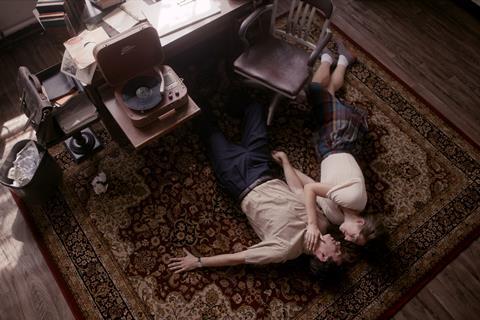Steve James explores the life of American spy Ted Hall in this gentle documentary

Dir/scr: Steve James. US/UK. 2022. 102 mins.
A love story, an espionage drama and a mini-history of the Cold War are all wrapped together in Steve James’ portrait of Ted and Joan Hall, a married American couple with a secret: Ted was a physicist who shared information about the country’s development of the atomic bomb with the Soviet Union. A Compassionate Spy has the air of a gentle reverie, focusing on contemporary interviews with Joan, who looks back on her life with her dear husband, who died in 1999, content in his belief that his subterfuge helped prevent doomsday. As such, the documentary doubles as a mournful reflection on the age of nuclear proliferation — and a tribute to those who opposed the buildup.
The lack of urgency can sometimes give the proceedings the stately languor of a public-television documentary
Screening out of competition in Venice, A Compassionate Spy will cater to fans of James, whose Hoop Dreams remains his most enduring work, although in recent years he has profiled Roger Ebert (Life Itself) and earned his first documentary Oscar nomination for Abacus: Small Enough To Jail. The revelation in the 1990s of Ted Hall’s espionage made national news, but many may still be unfamiliar with his story — although A Compassionate Spy is hardly paced like a white-knuckle thriller.
Theodore Alvin Hall was a talented young man with a bright future. Born in 1925, he attended Harvard before being hired by the US government in 1943 for the Manhattan Project, earning the distinction of being the youngest physicist tasked with creating the first atomic bomb. When he first met Joan Krakover, whom he married in 1947, Ted admitted to his bride-to-be that he’d divulged information to the Soviets, convinced that one single country shouldn’t have access to such a powerful weapon. Ted and Joan spent the rest of their lives concealing what he had done, while raising three daughters.
James draws from archival interviews with Ted so that his voice is prominent. (There is also a series of re-creations with actors depicting Ted and Joan in their younger years.) But Joan serves as our guide, describing a loving relationship between likeminded progressives who refused to demonise the Soviet Union. In fact, one of the documentary’s most incisive segments involves reminding viewers that, after World War II, there was a brief period when Americans revered the Soviets for standing up to Hitler. But soon, a fear of Communist infiltration swept across the US, resulting in political witch-hunts — and further incentivising Ted and Joan to keep quiet about his past spying.
With Mahler piano compositions dotting the soundtrack, A Compassionate Spy is intimate and modest, more about a marriage than geopolitical tensions. Even when we hear from those who think Ted was wrong to share America’s nuclear secrets — which A Compassionate Spy estimates may have helped advance the Soviets’ own program by five years — James keeps the drama at a low boil. Clearly, the film isn’t concerned with legislating the past, but humbly celebrating a principled man who followed his conscience. (A closing title card reads, “This film is dedicated to all those who have risked their lives for peace.”)
To be sure, there are limitations to James’ understated approach. The lack of urgency can sometimes give the proceedings the stately languor of a public-television documentary. But by investing in a more measured tone, James allows his film’s most resonant moments to hit harder — in particular, when the Halls are conflicted about what to do after married couple Julius and Ethel Rosenberg are convicted in 1953 for helping the Soviets, leading to their execution. And the flashes of insight can be quite revealing: Ted, who detested lying, sometimes wrestled with coming clean, and later somewhat regretted his spying once he learned about the cruelty of Stalin’s regime.
But A Compassionate Spy mostly views its subjects with sympathy, especially when weighed against the assertion brought up in the film that, without spies like Ted, the US might have waged nuclear war against an unprepared Soviet Union, which would have killed untold millions. Scholars recall the paranoid buildup of atomic weapons during the Cold War, and the film grimly points out that, more than 75 years after the bombing of Hiroshima and Nagasaki, “The United States remains the only nation to have used nuclear weapons in wartime.” Joan proves to be a warm presence, her devotion to her husband hardly faded because of his passing, but A Compassionate Spy never lets us forget the larger issues embedded in her and Ted’s story. They shared a touching romance, and also a secret that may have saved the world.
Production companies: Mitten Media, Kartemquin Films
International sales: Autlook welcome@autlookfilms.com
Producers: Mark Mitten Dave Lindorff, Steve James
Cinematography: Tom Bergmann
Production design: Laura Gordon
Editing: Steve James






![The Brightest SunScreen[Courtesy HKIFF]](https://d1nslcd7m2225b.cloudfront.net/Pictures/274x183/3/5/0/1448350_thebrightestsunscreencourtesyhkiff_312678.jpg)















![The Brightest SunScreen[Courtesy HKIFF]](https://d1nslcd7m2225b.cloudfront.net/Pictures/100x67/3/5/0/1448350_thebrightestsunscreencourtesyhkiff_312678.jpg)

